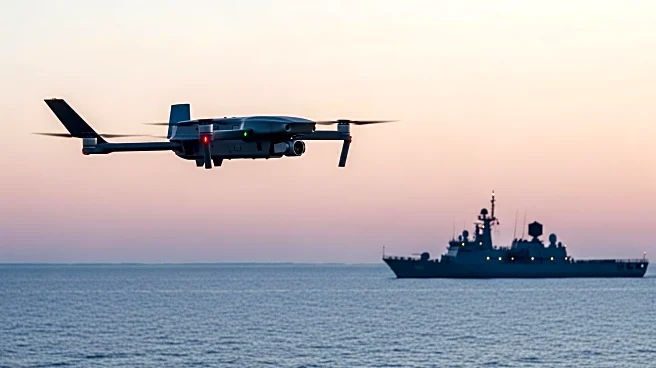What's Happening?
Denmark's defense ministry reported drone sightings at armed forces locations, prompting NATO to enhance surveillance in the Baltic Sea region. This follows previous drone incidents over Danish airports, raising security concerns amid suspected Russian aggression. NATO's Baltic Sentry initiative will deploy multi-domain assets to strengthen regional security. Denmark has banned civilian drone flights during the upcoming EU summit to prevent confusion with enemy drones. Germany and Sweden are providing military support, including anti-drone capabilities, to assist Denmark's security efforts.
Why It's Important?
The drone sightings in Denmark underscore growing security concerns in Northern Europe, particularly regarding potential Russian threats. NATO's increased vigilance in the Baltic Sea region reflects the alliance's commitment to protecting member states from transnational challenges. Denmark's ban on civilian drones highlights its proactive approach to ensuring the safety of EU leaders during the summit. The involvement of Germany and Sweden in providing military support demonstrates regional cooperation in addressing security issues. These developments may influence future NATO strategies and European defense policies.
What's Next?
Denmark is expected to continue monitoring drone activity closely, with public reports of suspicious sightings encouraged. The EU summit in Copenhagen will likely focus on security measures, with potential discussions on enhancing regional defense collaboration. Denmark may propose legislation to allow infrastructure owners to neutralize drones, reflecting a broader trend towards stricter drone regulations. NATO's Baltic Sentry initiative will likely expand its operations, potentially leading to increased military presence in the region. The situation may prompt diplomatic discussions with Russia to address security concerns.
Beyond the Headlines
The drone incidents in Denmark may have broader implications for international relations, particularly between NATO and Russia. The potential involvement of Russia in these activities could exacerbate existing tensions and influence diplomatic negotiations. The situation also raises ethical questions about drone usage and privacy, as governments balance security needs with civil liberties. The increased focus on drone technology may drive advancements in detection and neutralization systems, impacting the defense industry. Long-term, these developments could lead to shifts in European security policies and NATO's strategic priorities.










